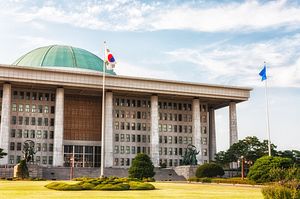Ever since its crushing defeat in the 2012 presidential election, South Korea’s liberal opposition has been characterized by low and dirty politics mired by infighting and elitism. Voters have grown restless of vain calls for reform among its leaders, which make futile attempts to part from frustrations by renaming the party or defecting to a new one.
To gut and mend the fraying bloc ahead of the crucial April 13 parliamentary election, which the ruling Saenuri Party stands to win big, the main opposition Minjoo Party has called on an unexpected hero — a right-wing hotshot who aided the victory of President Park Geun-hye.
Kim Chong-in, a 75-year-old economics professor turned policymaker, has an agenda of his own. The economic policy architect, who worked with former Presidents Chun Doo-hwan and Roh Tae-woo, criticized Park for going soft on the “economic democratization” plan for fairer welfare and wealth distribution that he designed for her campaign.
Landing outside of Park’s ruling clique earned him favor with the main opposition Minjoo Party’s then-leader Moon Jae-in, who was struggling to stop the wave of defections led by his frustrated ex-presidential co-aspirant Ahn Cheol-soo. Having brought Kim on board to steer the party’s election campaign, Moon succumbed to mounting pressure to bow out in January and gave Kim the keys to tow the fractured party to the center.
As interim leader, Kim has squarely taken the broom to the cobwebs, sweeping out the ideologist power elite loyal to the late Roh Moo-hyun — a task that Moon, the former president’s chief of staff, could have found impossible. Even high-ranking old-timers were not spared, with former prime minister Lee Hae-chan and nearly one-third of Minjoo’s incumbents excluded from the nomination list for next month’s polls.
At first, the bet seemed to have worked. Those who are not caught in the crossfire seem to find Kim’s discipline refreshing, with approval ratings for Moon and the Minjoo Party steadily recovering in local polls. Kim’s purge has muffled the party’s schism and deflated Ahn’s momentum to create his own party. Moon, still a top choice for president in 2017, has cleverly stayed away from the noise, restoring his name as his strategy plays out.
Kim’s former party has taken notice. Kim is in good company now that former health minister Chin Young — who had railed against President Park for her weak support for the elderly — has taken Kim’s hand to leave the Saenuri and jump on the Minjoo bandwagon. And the Saenuri has adopted the strategy, tapping another economist, Kang Bong-kyun, to go head to head against Kim.
But Kim is not immune to political drama, and his story threatens to end as quickly as it began. Concerns are rising over his increasingly iron-fisted rule, which culminated over the weekend as Kim slotted himself near the top of the party’s nomination list of proportional representatives, virtually guaranteeing himself a seat in the National Assembly. The party swiftly bumped him down on the list, meaning he can only earn the seat if the party performs well in the regional votes. Kim responded with the oft-used threat to resign if he didn’t get his way. Regardless of the results on April 13, the damage may be done for the public and the party’s trust.
If he can play down the recent flareup, Kim can shift the focus back toward his real enemy: Park’s “flawed” economic policies. He has said he has not thought about what will happen after the polls, but it remains to be seen whether Kim’s stronger party image will manage to gel enough to bring his long-sought economic democratization dream to life – or whether there is a place for him at all.
“I don’t see much of a role for Kim Chong-in, because there is a limit to which he can mobilize support in terms of popular liberal support and also in terms of the support that he can garner from within the Minjoo Party,” said Kim Jae-chun, a political scientist at Sogang Graduate School of International Studies. “I guess, either way, his days are pretty numbered.”
For now, he must prevent the party from returning to its infighting ways, lest his efforts to suit up a viable opposition to go against Park be all for naught.
































